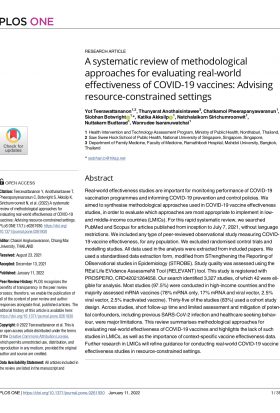This website uses cookies so that we can provide you with the best user experience possible. Cookie information is stored in your browser and performs functions such as recognising you when you return to our website and helping our team to understand which sections of the website you find most interesting and useful.
A systematic review of methodological approaches for evaluating real-world effectiveness of COVID-19 vaccines: Advising resource-constrained settings

Details
Abstract
Real-world effectiveness studies are important for monitoring performance of COVID-19 vaccination programmes and informing COVID-19 prevention and control policies. We aimed to synthesise methodological approaches used in COVID-19 vaccine effectiveness studies, in order to evaluate which approaches are most appropriate to implement in low-and middle-income countries (LMICs). For this rapid systematic review, we searched PubMed and Scopus for articles published from inception to July 7, 2021, without language restrictions. We included any type of peer-reviewed observational study measuring COVID-19 vaccine effectiveness, for any population. We excluded randomised control trials and modelling studies. All data used in the analysis were extracted from included papers. We used a standardised data extraction form, modified from STrengthening the Reporting of OBservational studies in Epidemiology (STROBE). Study quality was assessed using the REal Life EVidence AssessmeNt Tool (RELEVANT) tool. This study is registered with PROSPERO, CRD42021264658. Our search identified 3,327 studies, of which 42 were eligible for analysis. Most studies (97.5%) were conducted in high-income countries and the majority assessed mRNA vaccines (78% mRNA only, 17% mRNA and viral vector, 2.5% viral vector, 2.5% inactivated vaccine). Thirty-five of the studies (83%) used a cohort study design. Across studies, short follow-up time and limited assessment and mitigation of potential confounders, including previous SARS-CoV-2 infection and healthcare seeking behaviour, were major limitations. This review summarises methodological approaches for evaluating real-world effectiveness of COVID-19 vaccines and highlights the lack of such studies in LMICs, as well as the importance of context-specific vaccine effectiveness data. Further research in LMICs will refine guidance for conducting real-world COVID-19 vaccine effectiveness studies in resource-constrained settings.




